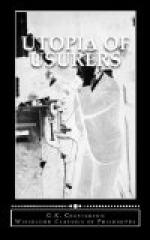There’s a far bell ringing
At the setting of the sun,
And a phantom voice is singing
Of the great days done.
There’s a far bell ringing,
And a phantom voice is singing
Of a fame forever clinging
To the great days done.
For the sunset breezes shiver,
Temeraire, Temeraire,
And she’s fading down the river....
Well, well, neither you nor I know whether she is fading down the river or not. It is quite enough for us to know, as King Alfred did, that a great many pirates have landed on both banks of the Thames.
Praise and Prophecy Impossible
At this moment that is the only kind of patriotic poem that could satisfy the emotions of a patriotic person. But it certainly is not the sort of poem that is expected from a Poet Laureate, either on the highest or the lowest theory of his office. He is either a great minstrel singing the victories of a great king, or he is a common Court official like the Groom of the Powder Closet. In the first case his praises should be true; in the second case they will nearly always be false; but in either case he must praise. And what there is for him to praise just now it would be precious hard to say. And if there is no great hope of a real poet, there is still less hope of a real prophet. What Newman called, I think, “The Prophetical Office,” that is, the institution of an inspired protest even against an inspired religion, certainly would not do in modern England. The Court is not likely to keep a tame prophet in order to encourage him to be wild. It is not likely to pay a man to say that wolves shall howl in Downing-street and vultures build their nests in Buckingham Palace. So vast has been the progress of humanity that these two things are quite impossible. We cannot have a great poet praising kings. We cannot have a great prophet denouncing kings. So I have to fall back on a third suggestion.




